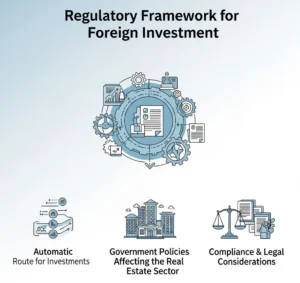The Indian real estate market is undergoing rapid changes, and one of the primary factors driving this transformation is foreign direct investment, or FDI. The Indian real estate market has emerged as a top destination for foreign investment, as more international investors view it as a lucrative business opportunity. In this blog, we will examine the dynamics of foreign direct investment (FDI) in the Indian real estate market, the factors that impact FDI, and the prospects for investors.
Overview of Foreign Direct Investment in Indian Real Estate
Definition and Importance of FDI
Investments made in a company or asset situated in another nation by a foreign entity or individual are referred to as foreign direct investment, or FDI. Foreign direct investment in land, property development, and real estate developments within India is referred to as FDI in the context of the Indian real estate industry. By bringing in money, technology, and experience from overseas, FDI significantly boosts the industry and advances the nation’s economy as a whole.
FDI has greatly benefited India’s real estate industry, especially in the areas of residential and commercial real estate, urban development, and the growth of infrastructure projects. India is one of the fastest-growing economies in the world, and foreign investors seeking to diversify their portfolios are drawn to the country due to its favourable demographics and quick urbanisation.
Current Trends in Foreign Investment
Foreign investment in the Indian real estate market has been steadily increasing over the past few years. According to a report, the industry is expected to attract even more investment in the years to come, particularly with the government’s pro-business policies and ongoing economic expansion. The Indian market is quite appealing to international investors, as it offers a wide range of investment sectors, including residential and commercial real estate, as well as specialised assets such as transportation and warehousing. Investment options include REITs, direct property purchases, and partnerships with local developers, offering flexible entry points based on investor goals.
Impact of FDI on the Indian Real Estate Sector
The Indian real estate industry has significantly benefited from FDI in many ways. Above all, it has led to the development of infrastructure and increased employment opportunities in both urban and rural areas. Additionally, by introducing international standards and practices, FDI has played a crucial role in enhancing the overall quality of urban planning and construction.
To meet the demands of the expanding urban population, new, contemporary residential and commercial complexes have been developed, thanks in part to foreign investments. The industry has been able to grow and change as a result of the substantial increase in demand for both residential and commercial real estate.
Investment Inflows in 2024
Expected Growth in Foreign Investments
It is anticipated that investment inflows into the Indian real estate market will increase significantly by 2024 and beyond. Foreign investors are increasing their market share due to factors such as political stability, a favourable regulatory environment, and India’s ongoing economic growth. Furthermore, because real estate is a relatively stable asset class, foreign organisations are finding it to be a desirable alternative during difficult times worldwide.
Key Players and Foreign Entities
India’s real estate market is experiencing substantial investment from numerous international companies. Businesses from Singapore, Japan, the United States, and the United Arab Emirates have made significant investments in real estate developments around India. These investors are seeking opportunities in tier-2 and tier-3 cities, which have substantial growth potential, in addition to major cities like Delhi, Mumbai, and Bangalore.
These international organisations often collaborate with regional developers to enhance project quality and ensure that local market demands are met while adhering to international standards. Given that India remains a popular destination for foreign real estate investments, the inflow of foreign capital is expected to continue.
Sector Analysis: Opportunities and Challenges
For international investors, the Indian real estate market presents both opportunities and challenges. On the one hand, numerous investment opportunities are arising from the rising demand for residential and commercial real estate, as well as infrastructure development. However, obstacles such as complex regulations, difficulties in acquiring land, and fluctuating real estate values remain significant concerns.
Due diligence and in-depth market research are crucial elements of every foreign investor’s investment plan, as they require careful navigation of these obstacles to access the Indian real estate market.

Regulatory Framework for Foreign Investment
Automatic Route for Investments
India’s liberalised foreign investment rules are a key factor in the nation’s rising FDI. In the majority of real estate projects, the Indian government has permitted foreign investors to enter under the “automatic route”, which eliminates the need for previous government or Reserve Bank of India (RBI) permission. For international investors, this has simplified and streamlined the procedure.
This automated path does have some restrictions, though, such as the minimum investment amount and the types of projects (commercial or residential) that the foreign corporation is permitted to invest in.
Government Policies Affecting the Real Estate Sector
Government policies have been supportive of foreign investments in the Indian real estate market, particularly in encouraging urbanisation and infrastructure development. Demand for real estate developments across the country has been significantly boosted by programmes like the Atal Mission for Rejuvenation and Urban Transformation (AMRUT), the Smart Cities Mission, and Make in India.
Furthermore, the tax system has been simplified by the Goods and Services Tax (GST), which was implemented in 2017. One of the key benefits of investing in real estate today is this simplified tax structure, which has made real estate investments easier to understand and less complicated.
Compliance and Legal Considerations
To invest in real estate in India, one must adhere to several legal and regulatory requirements. These rules, which encompass property ownership, construction requirements, and environmental regulations, must be adhered to by foreign investors. To avoid any legal obstacles and guarantee the success of their investments, investors are strongly advised to collaborate closely with legal experts.
Sector-Specific Insights
Real Estate Investment Trusts (REITs)
The creation of Real Estate Investment Trusts (REITs) is among the most inventive innovations in the Indian real estate industry. Foreign investors have the opportunity to participate in premium real estate assets through REITs without needing to purchase the property outright. These publicly traded companies purchase, manage, and sell properties that generate revenue by pooling investor funds. With comparatively little initial investment, foreign investors can now more easily access the Indian real estate market due to the growth of REITs in India.
Land and Development Projects
Foreign investors continue to prioritise land and development projects, particularly in urban areas where demand for both residential and commercial real estate is strong. The government’s efforts to promote affordable housing and urban development initiatives would increase investment in this field, presenting profitable prospects for international investors.
Warehousing Sector and Its Growth Potential
The warehousing sector has experienced exponential growth in recent years, driven by the surge in e-commerce and the rising demand for logistics and supply chain solutions. With the development of online shopping and the need for efficient logistics infrastructure, the warehousing sector is expected to remain one of the most promising areas for investment in the Indian real estate market. Foreign investors have already started to recognise the potential of this sector, making it an attractive avenue for real estate investment.
Future Outlook for Foreign Direct Investment
Predictions for the Real Estate Industry
The outlook for FDI in the Indian real estate sector is optimistic, with continued growth expected through 2025 and beyond. Factors like urbanisation, increased consumer spending, and a growing middle class are expected to drive demand for both residential and commercial real estate. With the Indian government continuing to offer investor-friendly policies, the country is set to remain an attractive destination for foreign investment in the real estate sector.
Investment Strategies for Foreign Investors
Foreign investors looking to enter the Indian real estate market in 2025 should focus on understanding market trends, conducting thorough research, and aligning investments with the evolving needs of the Indian economy. The use of innovative investment vehicles, such as REITs, the focus on infrastructure development, and the rise of the warehousing sector should be key considerations in their investment strategies.
Conclusion: The Future of Investment in India
In conclusion, the Indian real estate sector is poised for significant growth, and foreign direct investment will continue to play a pivotal role in this evolution. With the right policies in place, opportunities for both residential and commercial investments are abundant. The future of foreign investment in India’s real estate sector looks bright, and investors who can navigate the complexities of the market are well-positioned to reap substantial rewards.


Write Your Comment